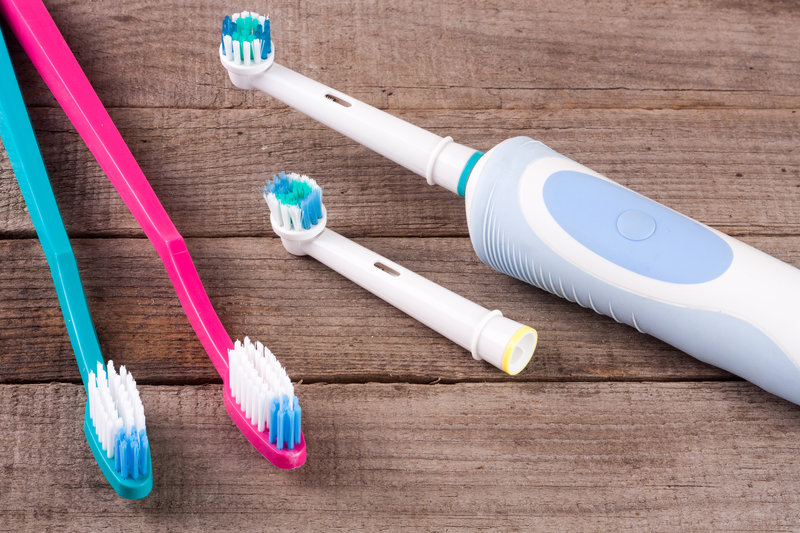What Toothbrushes Are Best for You?
What Happens to Your Teeth As You Age?
October 7, 2017The Differences between Adult and Baby Teeth
October 20, 2017
When it comes to choosing a toothbrush, what type do you prefer? Toothbrushes come in many shades, sizes, and hardness. Some patients prefer soft bristle toothbrushes, while others like hard bristles. Others, as well, prefer an electric toothbrush over the kind you have to manipulate yourself. Out of all the toothbrushes there are to choose from, which is best for you? That depends on your oral health, how hard or soft your enamel is, the state of your gums, and more. Let us help you learn about the different types of toothbrushes and see which one is right for your mouth!
Are All Toothbrushes the Same?
Some people might ask if all toothbrushes are the same. Most are fairly similar, but there are different shapes, hardness, sizes, and more that people have to consider when buying a brush that’s right for them. There are toothbrushes that are small and just right for children who are learning to brush their teeth. There are even small baby brushes and gum brushes to clean an infant’s mouth. For adults, there are many different brands to choose from. Some of the top rated brands include:
- Colgate
- Oral B
- Crest
- Gum
- Phillips Sonicare
- REACH
- DenTek
There are many brands of brushes, but these are some of the best and most recognized brands patients love. When choosing a toothbrush, you want to choose one with a comfortable handle that fits well with your hand. The more comfortable you are using your toothbrush, the more likely you are to keep using it. Toothbrushes come with various degrees of hardness in their bristles. Some even have gum massagers (or rubber parts) built into the heads. You want to choose soft-bristle brushes so that you get an effective clean on your teeth, but one that won’t erode away any tooth enamel. Some hard bristles can be too harsh on tooth enamel. As with every oral health product, look for the ADA Seal of Approval to know if you have a good brush.
Is An Electric Toothbrush Right for You?
Electric toothbrushes are great for patients who don’t do the best with cleaning their teeth well. They are also great for any patient frankly, but it’s a matter of preference if you choose electric over manual. Electric toothbrushes generally have a vibrating head that either moves in circles or back and forth. It can clear away plaque stronger than a manual brush and give a better clean in the back of the mouth. However, they do take some getting used to if you’ve bought one for the first time. There aren’t too many differences between a manual and electric brush when it comes to cleaning, but only if you brush an appropriate amount of time, reaching all areas effectively.
However, some studies show that electric toothbrushes might be better than manual brushes. Consumer Reports found that in 56 studies done, electric brushes have a slight edge at providing better dental hygiene than manual toothbrushes. You might also feel that you have a cleaner mouth when using an electric toothbrush. If those qualities are things you want in a toothbrush, then electric is definitely the way to go!
Care for Children’s Teeth
It’s never too early to start teaching children how to brush their own teeth. However, in the early years it’s important for parents to monitor their child’s brushing and flossing. It takes time for children to develop the motor skills and the patience to brush and floss the teeth the proper way. For an infant, it’s important to start brushing their teeth as soon as they start erupting in the mouth. Even before an infant has even one tooth, it’s smart to start wiping their gums with a wet washcloth. This can be done at bathtime, which will help get them in the habit of having their gums and teeth cleaned every day when the teeth come in.
For infants, brush the teeth twice a day just as you would a child or an adult. Brush both the inside and outside of each tooth and the infant’s tongue if it’s possible. Toothbrushes for babies are generally bright in color and small so that they can fit inside a baby’s mouth. The amount of toothpaste you use should be about the size of a grain of rice. As your baby ages (2-3 years old), they will want to help out with toothbrushing. Help them to brush the teeth until they have developed the skills to do it right and always monitor your child’s oral health habits throughout childhood and adolescence.
Good Oral Hygiene Is Best for You
Whether you are taking care of adult teeth or infant/child teeth, the most important part is that you are conscious about your oral health. The baby teeth must be cared for just as much as the adult, permanent teeth. Children and adults can both benefit from manual or electric toothbrushes, but good brushing must occur several times a day to avoid tooth decay. If you have more questions about infant and child oral health, toothbrushes, or how to take care of your teeth, call our Hardy Pediatric Dentistry and Orthodontics office today at (720) 887-6003!